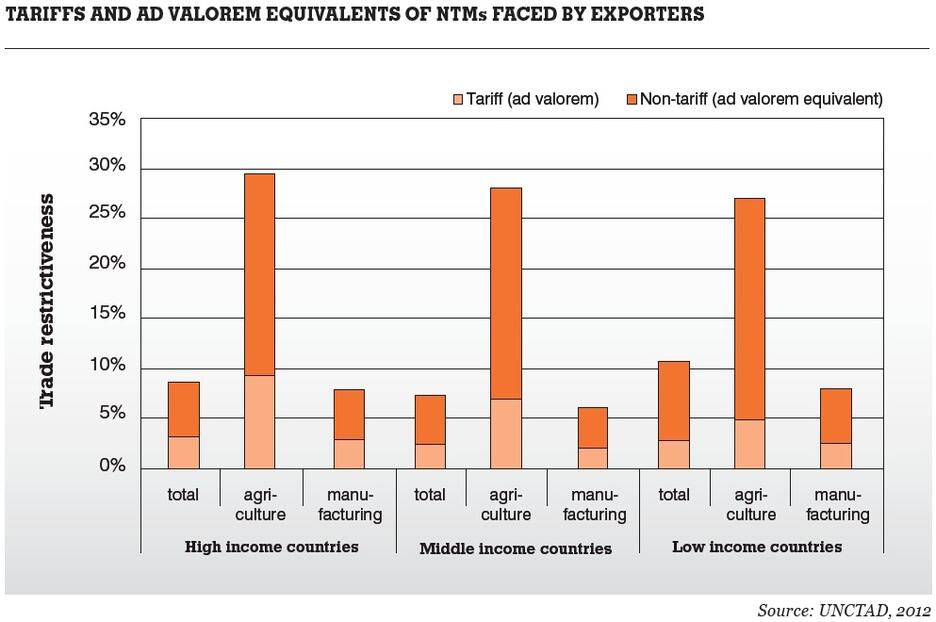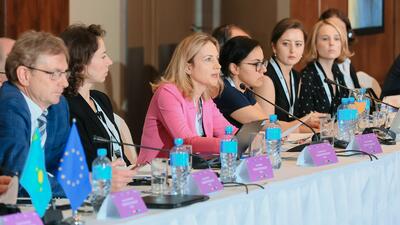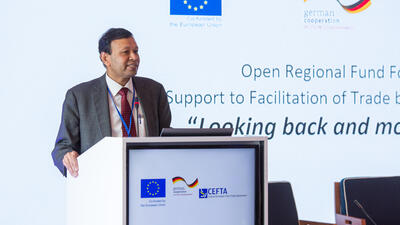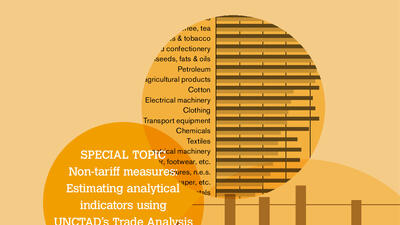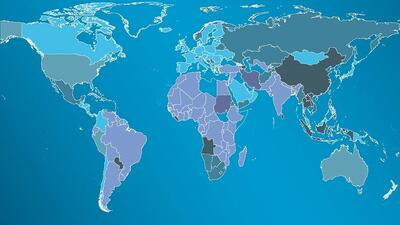Non-tariff measures: A key issue in evolving trade policy
This is because the ability of developing countries to gain reliable market access depends on their compliance with an increasing number of regulatory measures that go beyond the realm of traditional trade policies. NTMs include a diverse array of policies and can have different purposes. Some are manifestly employed as instruments of commercial policy, such as quotas, trade-related subsidies, trade defence measures and export restrictions, but most stem from non-trade policy objectives, such as technical measures that ensure quality, safety, performance and environmental protection. The increasing importance of NTMs in determining market access conditions is due to two main factors. First, modern societies require an increasing number of product standards and regulations to respond to growing societal demands for health, safety and environmental protection. Second, traditional forms of trade policy have lower significance. In most product lines other than agricultural products, tariffs are generally low as they have been liberalized first under the auspices of the General Agreement on Tariffs and Trade and the World Trade Organization (WTO), and subsequently in the context of regional and bilateral preferential trade agreements. For developing countries, tariffs have also become less of an impediment because of Generalised System of Preferences programmes and other preferential schemes. The fact that tariff liberalization alone has generally proven insufficient in providing genuine market access for developing countries' exports suggests that addressing NTMs, especially those with discriminatory and protectionist intentions, is now a key element in an effective and fair integration of developing countries in the world economy.
The importance of NTMs in restricting international trade has recently been quantified in a number of studies by the United Nations Conference on Trade and Development (UNCTAD) and other organizations. The results are striking as they show NTMs have a large impact on the cost of cross-border transactions and that many of the policies have a much higher restrictive effect than traditional tariffs. In some extreme cases, NTMs are far more important than tariffs in restricting access to markets. For example, although existing systems of preferences grant low-income countries a relatively low tariff for their agricultural exports, about 5% on average, once the ad valorem equivalent effect of NTMs is taken into consideration the total restrictiveness becomes much larger, at about 27%.
UNCTAD has long been at the forefront of efforts to address non-tariff barriers to developing countries' trade. Indeed, some of the issues related to NTMs were highlighted in the 1960s as priority topics of UNCTAD intergovernmental discussions and reports such as the 1968 UNCTAD document Liberalization of Tariffs and Non-tariff Barriers. UNCTAD also has a long history of collecting, organizing and disseminating data on NTMs. It developed the first comprehensive NTM classification and started collecting and organizing data on NTMs in the early 1990s. Recently, a much improved classification of NTMs embracing forms of NTMs that were of lesser importance decades ago, such as technical barriers to trade and sanitary and phytosanitary measures, has been developed. This new classification has been adopted by UNCTAD for official NTM data collection and by the WTO for its existing notification mechanisms.
Over the past few years, other international and regional organizations, including ITC, joined UNCTAD in its effort to address the issue of NTMs and their effect on international trade, particularly under the aegis of the Group of Eminent Persons convened by the Secretary-General of UNCTAD in 2006. Most recently, UNCTAD, ITC, the World Bank and the African Development Bank launched the Transparency-in-Trade initiative (TNT), pledging resources to improve trade policy data collection procedures and to freely provide this data through the agencies' respective data dissemination platforms. The TNT initiative spans several areas of trade policy, including tariffs, NTMs, trade defence measures and services regulations. UNCTAD is the coordinating agency for data on NTMs. Such unique multi-agency initiatives are instrumental in ensuring transparency, increasing awareness and providing information to both policymakers and entrepreneurs on the changing trade policy landscape. Governments as well as private enterprises need to be constantly aware of the specific trade barriers and regulations that prevail in potential export markets. They also need to understand which of these are most restrictive so that trade negotiations and trade facilitation mechanisms can be centred on addressing those of higher priority. Moreover, the TNT initiative is valuable in identifying and containing a possible protectionist backlash in trade policy, especially in periods of economic crisis.
Although improving transparency is important, policy research and analysis are also essential to a better understanding of the implications of NTMs for developing countries. UNCTAD has produced a variety of analytical documents on NTMs, such as reports for its intergovernmental meetings and policy research and working papers. The most recent report, published in 2012 and entitled Non-tariff measures to trade: Economic and policy issues for developing countries, provides an analysis based on new evidence of the impact of NTMs on developing countries' trade. It shows how the use of various types of NTMs has evolved over the past decade and how these measures disproportionally affect trade in agricultural products and other sectors of substantial export interest to developing countries, such as textiles and clothing. Moreover, the report highlights that the effects of NTMs are dependent not only on regulatory frameworks per se, but also on their implementation procedures and administration mechanisms. The report goes on to deal with designing practical policy responses to streamline and harmonize NTMs. In this regard, the report highlights how the multilateral policymaking process, although complex, is critical in minimizing the possible trade restrictive and discriminatory effects of NTMs.
Although recent research and analysis, both at UNCTAD and elsewhere, have contributed to a better understanding of NTMs and their effects, many important policy questions remain open. One key issue needing more thorough analysis is related to the likely discriminatory effects of NTMs. More specifically, although nominally non-discriminatory, NTMs can have discriminatory effects on developing countries, as well as on small- and medium-sized enterprises (SMEs). There are various reasons for this. First, developing countries and SMEs often have more limited capacity or incur higher costs to meet the requirements of some types of NTMs, especially those of a complex technical nature. This is due to less advanced production technologies, weaker trade-related infrastructure, inadequate export-related services, or simply a lack of economies of scale to cope with the fixed costs required to meet many NTMs. Discrimination may also result from an informational problem. Smaller firms may not have the resources to fully understand the nature and implications of the NTMs that their exports face, or even less so how to comply with them. Finally, discriminatory treatment can also be caused by the more rigorous administrative procedures that are often applied on imports originating from developing countries, especially from least developed countries. Besides the discriminatory element, there are wider development issues in which NTMs can have a critical impact and require further analysis. One issue of particular interest from a development perspective is the effect of NTMs on poverty and inequality. NTMs may not only preclude SMEs or small farmers from accessing international markets, but also constrain small players in supplying domestic markets. This may have major repercussions on employment and consequently on income distribution. Food security is another important issue inherently related to NTMs. This applies not only to export restrictions, but also to standards and technical regulations and their international harmonization processes. Standards may lead to a segmentation of international and domestic markets resulting in food surplus and food deficit areas.
Most importantly there is a need to develop comprehensive and coherent international approaches to effectively address NTMs in a policymaking context. In this regard, one important task is to identify the ultimate purpose of specific NTMs. This affects how the NTMs should be addressed both domestically and internationally. Domestically, this would require a balanced approach to ensure that NTMs can maintain their legitimate purposes, but at the lowest possible costs and restrictiveness. Internationally, while explicit protectionist policy instruments with protectionist intent, such as export subsidies, quotas and local content requirements, are generally dealt with within the WTO framework, policies serving legitimate objectives, such as protection of health or the environment, need to be evaluated through a careful cost-benefit analysis. Regional and bilateral trade agreements could be a good testing platform to conduct such assessments. Another approach may be through plurilateral agreements on harmonization, or mutual recognition of technical regulations and standards.
In summary, UNCTAD sees the increased transparency and better understanding of the effects of non-traditional trade policies as an essential issue on the trade agenda of the 21st century. UNCTAD will continue working on NTMs, as mandated by its thirteenth conference in Doha in April 2012, by improving data collection and dissemination, and by strengthening its research and analysis. As the task of tackling NTMs is enormous, UNCTAD is pursuing a strategy of collaboration with other international and regional agencies, and is confident that this work will lead to a better understanding of the issue of NTMs for the benefit of all member states.




